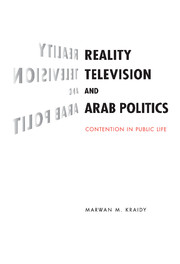Book contents
- Frontmatter
- Contents
- Acknowledgments
- Preface
- Introduction: Beyond al-Jazeera
- 1 Screens of Contention: The Battle for Arab Viewers
- 2 Voting Islam Off the Island? Big Brother in Bahrain
- 3 The Saudi-Lebanese Connection
- 4 Contesting Reality: Star Academy and Islamic Authenticity in Saudi Arabia
- 5 Gendering Reality: Kuwait in the Eye of the Storm
- 6 A Battle of Nations: Superstar and the Lebanon-Syria Media War
- 7 The “New Middle East”? Reality Television and the “Independence Intifada”
- Conclusion: Performing Politics, Taming Modernity
- List of Interviews
- Further Readings
- Bibliography
- Index
- Titles in the Series
1 - Screens of Contention: The Battle for Arab Viewers
Published online by Cambridge University Press: 05 June 2012
- Frontmatter
- Contents
- Acknowledgments
- Preface
- Introduction: Beyond al-Jazeera
- 1 Screens of Contention: The Battle for Arab Viewers
- 2 Voting Islam Off the Island? Big Brother in Bahrain
- 3 The Saudi-Lebanese Connection
- 4 Contesting Reality: Star Academy and Islamic Authenticity in Saudi Arabia
- 5 Gendering Reality: Kuwait in the Eye of the Storm
- 6 A Battle of Nations: Superstar and the Lebanon-Syria Media War
- 7 The “New Middle East”? Reality Television and the “Independence Intifada”
- Conclusion: Performing Politics, Taming Modernity
- List of Interviews
- Further Readings
- Bibliography
- Index
- Titles in the Series
Summary
When the English philosopher George Edward Moore wrote that “[w]henever a philosopher says something is ‘really real,’ you can be really sure that what he says is ‘really real’ isn't real, really,” he could have been describing how Arab viewers related to their state-owned television channels until the 1990s. For decades Arab television had a warped relation to reality. Under the stifling control of the Ministries of Information, media institutions presented a reality that most listeners and viewers knew to be unreal. Every once in a while, Libyan viewers were reportedly treated to what can only be described as surreal: regular programming would be interrupted by a still picture of a pensive Mu‘ammar al-Qaddhafi with a caption informing viewers that “the leader” was “contemplating the future of the nation.” Even less meditative regimes expediently manufactured their own “reality” through controlled media that rarely gave listeners and viewers access to alternative views. Predictably, Arabs turned en masse to foreign broadcasters. In wartime Lebanon, we used to “triangulate” in search of reliable information. Huddled around a battery-operated transistor radio during long, electricity-deprived evenings, we would listen to a couple of local radio news bulletins from opposing camps and then move on to the French Radio Monte-Carlo Middle East, BBC Radio, and, less frequently, Voice of America or Radio Moscow.
The explosive growth of pan-Arab satellite channels since 1990 has demoted broadcasts from Paris, London, Washington, and Moscow. Today the average Arab viewer can “triangulate” by using exclusively Arabic-language media.
- Type
- Chapter
- Information
- Reality Television and Arab PoliticsContention in Public Life, pp. 22 - 45Publisher: Cambridge University PressPrint publication year: 2009



